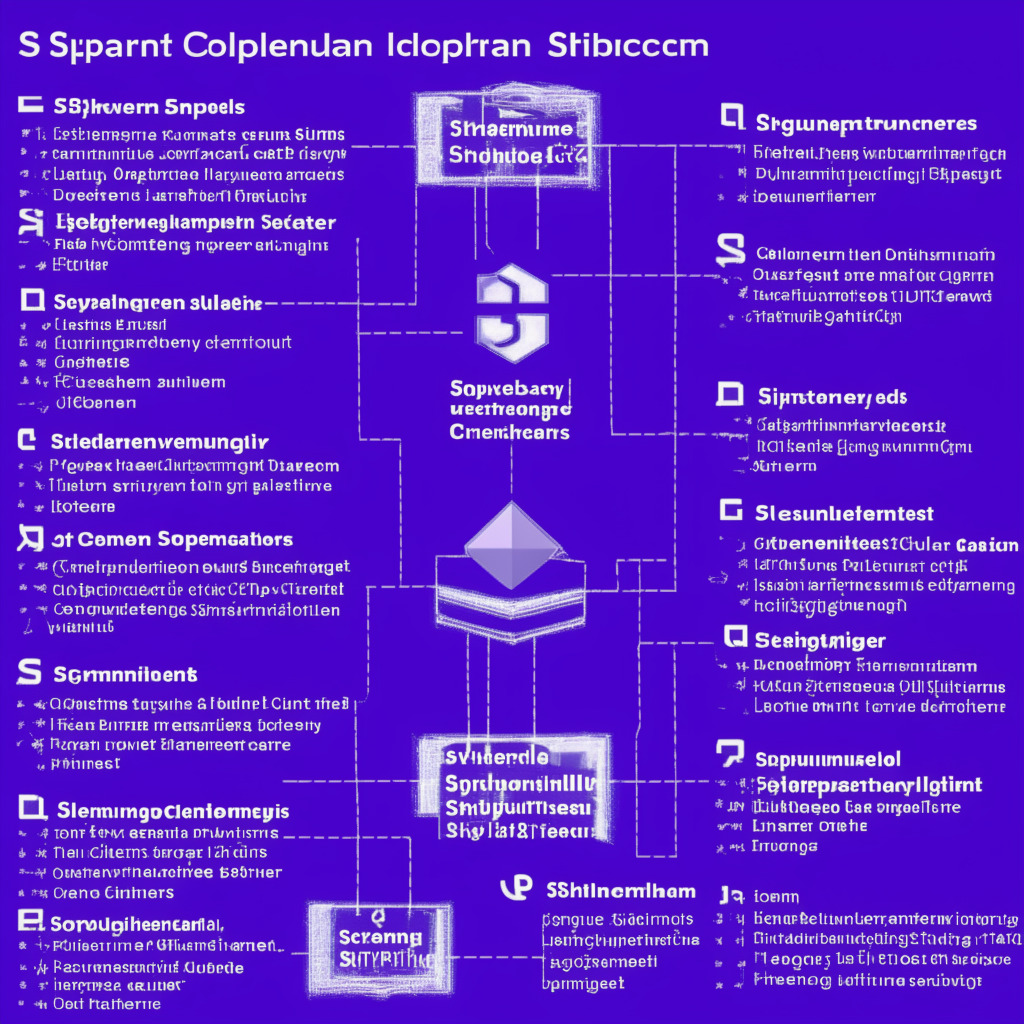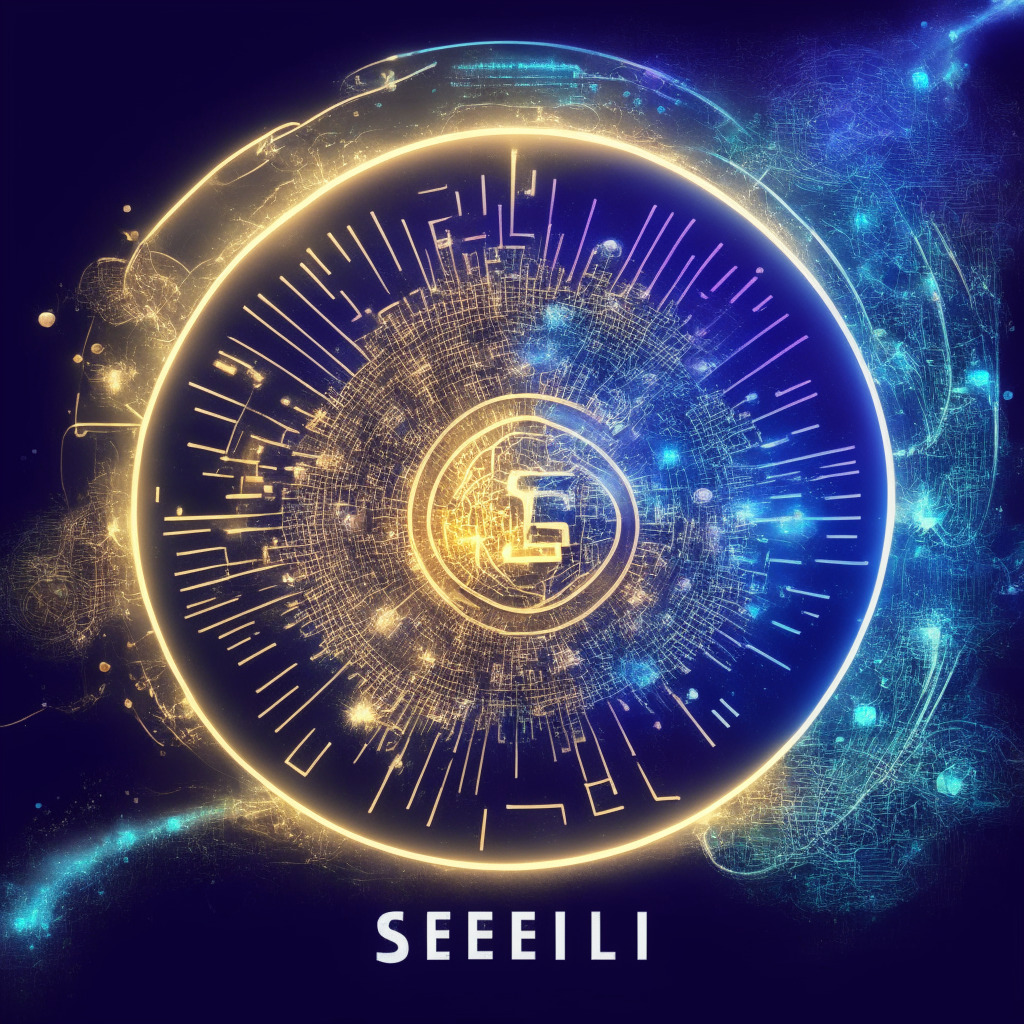Optimism’s Bedrock release has significantly reduced gas costs, with average fees per transaction decreasing by 74.5% in USD and 73.9% in ETH. This upgrade prepares Optimism for a Superchain future and emphasizes collaboration in the interchain world, driving innovation and benefiting users and developers.
Search Results for: Bedrock
Ethereum’s Optimism Network Upgrade: Creating a Superchain with Bedrock
The Optimism network recently implemented a significant upgrade called “Bedrock,” transforming Ethereum’s native token, ETH, into a native token alongside Optimism’s own OP token. This upgrade aims to create a “Superchain” of interoperable and composable blockchains, enhancing the capabilities of both layer 1 and layer 2 networks.
Ethereum Optimism’s Bedrock Upgrade: Boon or Bane for Blockchain’s Future?
Ethereum’s Optimism layer 2 scaling solution completes its Bedrock upgrade, reducing deposit-confirmation times to 1 minute and lowering gas fees by 40%. The upgrade aims to improve performance and cost-effectiveness, but potential compatibility and stability issues within the multi-client ecosystem warrant cautious optimism.
Ethereum Superchain: The Optimism Bedrock Upgrade and Its Impact on Blockchain Landscape
Optimism’s Bedrock upgrade aims to improve Ethereum’s usability by reducing gas fees by 40% and deposit-confirmation times by 90%. This significant step towards a “Superchain” could revolutionize the blockchain landscape, providing a more secure and efficient platform for transactions, while facing intense competition from other layer 2 solutions like Arbitrum and ZK Rollups.
Unlocking OP Tokens: Doom or Boom for Optimism’s Future amid Bedrock Upgrade and Low Liquidity
The recent unlocking of 114% of Optimism’s previous circulating supply led to a near 50% decline in its OP token’s value. Despite this, upcoming events like the Bedrock upgrade and projects like Worldcoin and Coinbase’s Base testnet building on the OP stack indicate a more optimistic outlook for the Ethereum layer-2 solution.
Ethereum’s Evolution to Superchain: Bedrock’s Impact on Transaction Fees and Security
Optimism’s Bedrock release is set to transform Ethereum into a Superchain, enabling seamless communication and collaboration between chains. The upgrade aims to reduce transaction fees, shorten deposit times, and ensure maximum security through a two-step withdrawal process. Scheduled for June 6, the mainnet upgrade brings Ethereum closer to a multi-client ecosystem, promoting interoperability and standardization within the blockchain community.
Ethereum’s Bedrock Hard Fork: Optimism’s Game Changer or Arbitrum’s Continued Dominance?
The Ethereum blockchain will undergo the Bedrock hard fork on June 6 as Optimism, a layer 2 scaling solution, introduces a major upgrade for improved modularity, simplicity, and Ethereum equivalence. This is expected to increase performance and functionality, while fueling positive market sentiment for Optimism’s Layer 2 network.
Optimism’s Bedrock Upgrade: Pros, Cons, and Impact on Ethereum Scaling Solutions
The upcoming Bedrock upgrade for Layer 2 scaling solution Optimism aims to improve transaction fees, network security, and Ethereum compatibility. Benefits include a 47% decrease in fees, shortened deposit times, and enhanced Ethereum Virtual Machine compatibility, positioning Optimism competitively in the Layer 2 space.
The Dance of Regulations and Crypto: Boon or Bane to the Blockchain Future?
The former CEO of Voyager Digital, now under regulatory scrutiny for allegedly violating U.S. derivatives regulations, views these allegations as retrospective application of rules. This comes after Voyager’s bankruptcy and amid investigations into its unfair marketing practices. Regulations, while possibly seen as constraints, can provide stability and customer protection in the crypto market.
Ethereum Staking Surge Sparks Centralization Concerns: A Deeper Dive into JPMorgan’s Analysis
The article reveals Ethereum’s staking growth is leading to increased centralization, with five entities controlling most staking activities. This generates risks like potential single points of failure and lower staking yields. Analysts suggest this centralization might challenge blockchain networks’ decentralization and trustlessness principles.
PayPal’s PYUSD Stablecoin: Welcomed Asset or Threat to Tether’s Predominance?
Tether co-founder, William Quigley, in a recent interview expressed skepticism towards the acceptance of PayPal’s impending stablecoin. Highlighting that cryptocurrencies earn credibility over time, he outlined that new entrant, PayPal, would face challenges in gaining trust and performance reputation among crypto users. He flagged significant regulatory challenges and the high cost of compliance as potential hurdles for PayPal’s stablecoin.
Deciphering the Grey Areas: Blockchain Regulations in Light of the FTX Debacle
“The sequential nature of the blockchain forms the bedrock of cryptocurrencies, yet it faces regulatory scrutiny. An incident involving Sam Bankman-Fried of FTX has catalyzed attention towards regulations around blockchain. Amid this, Taiwan and Hong Kong have imposed stringent rules on crypto exchanges. Regulation, seen as essential to prevent crises like the FTX debacle and ensure trust in this booming market, hangs in the balance as the blockchain leaps into the future.”
Balancing Potential and Threats: Unpacking Amazon’s Big Bet on AI Startup Anthropic
Amazon’s $4 billion investment in AI start-up Anthropic could enhance the world of artificial intelligence and open up new possibilities. However, concerns about lack of clear governance and Amazon’s increasing control over AI advancements spark worry amidst this technological progression.
Harnessing Blockchain’s Potential in Africa: The Intricate Tug-of-War with Poverty
“Blockchain technology’s mainstream adoption in Africa hinges on poverty eradication. Stakeholders believe a society devoid of poverty forms a stronger environment for blockchain incorporation. Despite economic struggles, Nigeria’s significant interest in cryptocurrencies and potential for blockchain integration shows promise. Nevertheless, this progress depends on achieving economic stability.”
Implications of Cryptocurrency Inclusion in US Accounting Rules: The Triumphs & Tribulations
The adjustment to the FASB accounting rules extends fair value accounting to include cryptocurrency holdings, impacting all organizations that align with U.S. GAAP. This realignment redefines the understanding of discriminatory aspects like fair value, potentially encouraging more corporate adoption of crypto. However, the change also heightens the volatility risk in earnings.
Shifting Alliances in Crypto Winter: MakerDAO’s Migration and Ethereum’s Controversy
“In the midst of a crypto winter, the blockchain industry is innovating and adapting. Major shifts like MakerDAO’s potential move from Ethereum to Solana or Cosmos depict this change. Discussions suggesting Ethereum should have a “Supreme Court” for disputes also indicate this evolution. Amid technological advances, the volatile crypto world is reminded: “Money doesn’t materialize out of thin air.””
Oxford’s JAX-LOB: Facilitating AI Trading and Reshaping Financial Markets
A multidisciplinary team from the University of Oxford developed JAX-LOB, the first GPU-accelerated limit order book simulator. Using JAX, a high-performing machine learning system by Google, the simulator enables AI training directly on financial data, potentially revolutionizing the financial world.
Blockchain Future: Balancing the Pitfalls and Potentials of a Digital Revolution
“Blockchain technology offers potential benefits like improved transaction speed, efficiency, and security. However, the future of these systems faces challenges like regulatory interventions, cyber threats, and market volatility. Despite these issues, blockchain and cryptocurrencies hold significant revolutionary potential in our financial systems.”
The Double-Edged Sword of Crypto Influencers: Trust, Transparency, and Investor Education
“Crypto influencers endorsing dubious tokens can cause ordinary investors to suffer. High-profile individuals can trigger market fluctuations. Such manipulations question the integrity of the crypto community, highlighting the need for influencer transparency and investor education. Individual due diligence is emphasized as the bedrock of crypto investing.”
Navigating the High Seas of Crypto: Hedera Hashgraph’s Struggles and Sonik Coin’s Ascendance
“Hedera Hashgraph sees mixed market performance amidst growing skepticism despite significant partnerships. Sonik Coin, a promising newcomer, offers a viable route for passive income with its remarkable 4,300% staking APY, seeking stability amidst the turbulent crypto-sea, reminiscent of successful $PEPE, Pepecoin’s trajectory.”
Unveiling The Pyramid Scheme of Shenzhen Shikongyun Tech: A Dark Chapter in Crypto History
Shenzhen Shikongyun Technology, a prominent Filecoin mining firm, is accused of orchestrating a $83.2 million pyramid scheme. The firm allegedly exaggerated profit expectations through a hierarchical system to recruit potential customers. Additional allegations developed when platforms bpool.io and filpool.io were used for MLM activities, reportedly to deceive and defraud investors.
Assessing the Potential of Sei Network’s Native Token: A Deep Dive into Its Prospects and Challenges
“The Sei Network’s native token, SEI, made a grand entry with a $1.8 billion fully diluted valuation. Amid market enthusiasm, potential investors are keeping an eye on SEI’s performance. The transaction speed, scalability, and utility of SEI tokens on various platforms could determine its future valuation. Cryptocurrencies like SEI play a significant role in digital economies, and market watchers eagerly await its impact on the dynamic digital paradigm.”
Decoding the Andrew Horowitz Bet on ZK Proofs: Unlocking Blockchain’s Future or Unlocking Concerns?
Venture capital firm Andreessen Horowitz (a16z) is investing in the development of zero-knowledge (ZK) proofs and open-source software projects, Lasso and Jolt, aiming for scaling blockchains while preserving transaction privacy. These technological advancements may transform blockchain’s scalability and privacy, but could also introduce new vulnerabilities and challenges.
Saddle Finance Shutdown: A Portentous Shift in Blockchain dynamics or a Necessary Precaution?
“The recent announcement of Saddle Finance, an Ethereum-based crypto trading protocol, to cease operations and disburse its treasury to its investors, paints an intriguing picture of the changes in the blockchain space. This incident, following a major hack on Curve, serves as a stark reminder of the ever-present threat of exploitable bugs in the blockchain universe, and stresses the importance of investor vigilance.”
The LIBOR Lessons: What Cryptocurrency Can Learn from Past Financial Scandals
The transition from LIBOR to the Second Overnight Financing Rate highlights issues similar to those facing the crypto industry, including misconduct, corruption, and slow regulatory response. This shift has implications for crypto, like LIBOR, it enjoys minimal oversight over major players. With crypto’s rise as a top-performing asset, questions surface: Will crypto follow LIBOR’s path? Can the financial system include crypto in future reforms?
Navigating the Crypto Fog: Unveiling the Potential of yPredict’s AI-Driven Crypto Signals
“yPredict, a new crypto trading platform, offers augmented crypto signals via Artificial Intelligence, promising precise, data-driven trading trajectories. Fostering a beneficial environment for traders and experts, yPredict enables followers to scrutinize various coins, subscribe to predictive models, and partake in decision-making and staking.”
Bitcoin Market Dynamics: Scrutinizing the Influence of Grayscale’s ETF Appeal, Global Economy and Technical Analysis
“In a controversial move, Grayscale has asked the SEC to approve Bitcoin ETFs en masse, which has yet to gain market support. With Bitcoin’s recent price fluctuations influenced by developments such as Bank of Japan’s potential changes to Yield Curve Management, it’s clear that strategic investment decisions are crucial in fast-paced, volatile cryptocurrency markets.”
The Blockchain Dance-Off: Optimism Outperforms Arbitrum in Transaction Volume Reversal
Optimism, a Layer-2 solution for Ethereum utilizing optimistic rollup technology, has surpassed its rival Arbitrum in terms of transaction volume for the first time in six months. This was largely driven by the launch of Worldcoin on Optimism and a reduction in transaction fees due to Optimism’s Bedrock upgrade. However, Optimism still trails Arbitrum considering the total value locked within contracts.
The Future is in Your Eye: Exploring Worldcoin’s Biometric Verification Orb and Identity Security
“Worldcoin, a startup co-founded by Sam Altman of OpenAI, is making its mark with a novel approach to verify identity that involves iris scanning. The tech assures users of privacy, stating that scans are only used for unique digital identifiers and are not stored. While privacy concerns persist, the experience is user-friendly, attempting to alleviate anxieties with a transparent approach, including open-sourcing most hardware and software protocols.”
Unpacking the Prospects of Bitcoin and BTC20: An Exciting Showdown in the Blockchain Market
“Analysis of the current Bitcoin prices suggests a critical support price around $29,550, while $30,000 holds significant psychological importance for investors. Meanwhile, BTC20, a less costly alternative, aims to capture the appeal of Bitcoin’s early days, blending traditional Bitcoin technology with emerging blockchain trends.”
Arkham Intelligence’s ARKM Token: A Tale of Crypto Potential and Privacy Concerns
“Arkham Intelligence, a leading blockchain analytics firm, introduced its native token, ARKM, trading at $0.75. Despite concerns about user safety and data privacy, the “intel-to-earn” token maintains investment appeal, raising $10 million over two rounds, building a robust $113 million market cap.”
Blockchain Gaming Revolution: Spielworks’ Refundable NFTs and the Balance of Innovation and Caution
Blockchain gaming startup Spielworks has partnered with Mycelium Network to create a refundable Non-Fungible Token (NFT) program. The NFTs, named “Reverties”, allow gamers to receive full refunds in USD Coin through a new minting mechanism. Additionally, interest from the decentralized finance lending pool contributes to environmental causes. However, potential challenges include the sustainability of the program and uncertainty over user reception of the new minting process.































